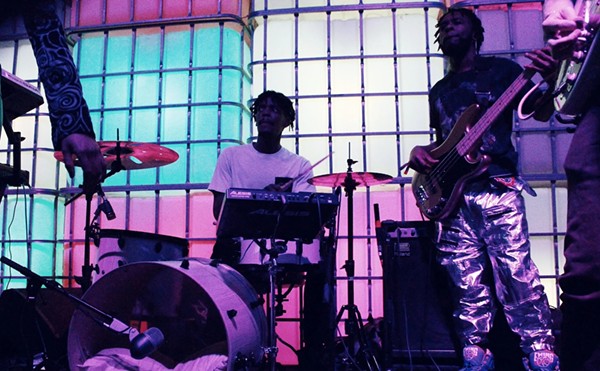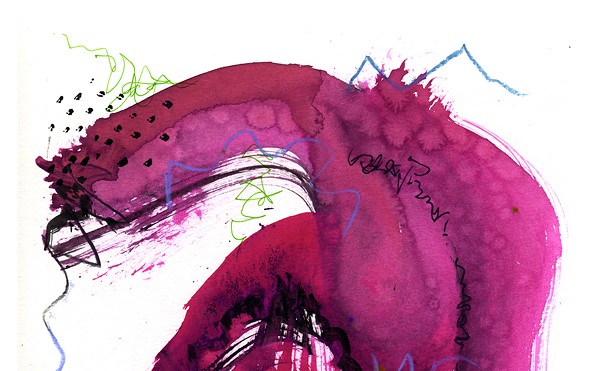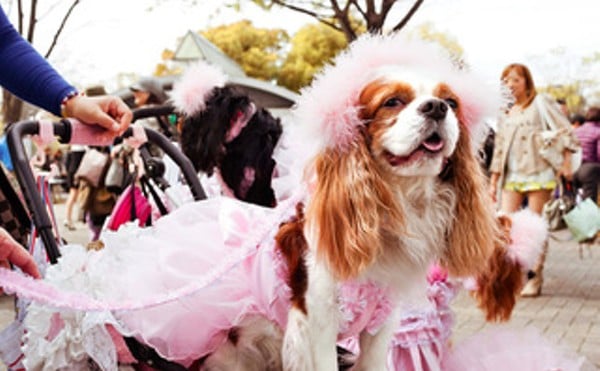Onimikì
BY BRUCE PRIDDY
Cancer has hollowed my grandpa out, the only part of him left are regrets. From his hospital bed, he looks at our gathered family and says things like, “I never was a very good human.” An uncle will rub his shoulder and say, “You raised us well. We never wanted for anything.” Or an aunt will kiss his forehead and say, “Mom loved you.” Grandpa says that he doesn’t want to die here in the hospital. He wants to go to where he met my grandma. Someone strokes his still black hair, defiant of disease and decades, tells him a story he’s forgotten. My grandparents met in France, during the war when he was a soldier and she a nurse. They’re sorry but he’s too weak to travel that far. Or anywhere.
Grandpa slaps the hand away. “That’s not how it happened,” he’s yelling. “She found me when I fell out of the sky.” It is storming outside. There is a clap of thunder with his every word. His voice is as temporary. His mouth gapes but the words are caught on something deep in him. I see tendrils of cancer reach up, grab the words, crush, eat them. He sinks back into the bed. “I want to go home,” he says, rolling away so we can’t see his tears. We can still hear them in every gasped word. Before anyone can tell him the “we’ll-see-what-we-can-do” lie, he says, “My real home, from before I hit the ground.”
My family says nothing to each other. An aunt tries to hide a sob. It sounds like a sneeze. After eating his lungs, his lymph-nodes and his marrow, the cancer is still hungry. It’s gorging on his memories now, crapping out fake ones. When this happens, a person doesn’t have long. We knew this would be grandpa’s last trip to the hospital but there are degrees of knowing. We find ourselves at knowing-without-question.
One of my uncles, the eldest after my dad, stands and announces we should get something to eat. Everyone is quick to agree. We line up to squeeze Grandpa’s hand or kiss his forehead. Practice for the funeral.
I’m the last. I squeeze his shoulder gently. Anything else would break his hollow bones. Grandpa grabs my wrist in both hands, his finger-tips digging in so I can’t get away. “You believe me, don’t you, boy?” He used to call my dad “boy.” He’s confused us again. Cancer tricks him into thinking his son isn’t dead from black ice and tight curves. I can hear the tumors laughing.
He asks again, calls me boy again. “I do, Grandpa. I do,” I say and it is a true thing. Tubes feed him life, force oxygen into his lungs and steal his pain. Machines tracking his every heartbeat and labored breath translate them into a mechanical beat. These make it easy to believe. He is every monkey, every dog in every terrible Space Race experiment. He is a bird dying from spending too much time on the ground.
Behind us, the television screeches in short bursts then a long, hoarse electronic hum. Someone turned it on days ago hoping it would drown out Grandpa’s cancer and our grief. Now it shows a blob of yellows and reds consuming the county we live in, everywhere I’ve ever been. A nurse sticks her head in the door. She says they’re moving the patients to the lower floors. They’ll be in shortly to move him. I pull myself from Grandpa’s grasp, he takes skin with him. At the window, I see coils of charcoal-colored clouds so low I could breathe them in.
“This is our chance,” Grandpa says. I turn back to him, confused. “To send me home,” he says. I shake my head and tell him he’ll die. He makes a sound like a laugh caught in a cough or a cough caught in a laugh. “I already am dying, boy. Let me die how I want.”
Because I love him I cannot argue with him. Because I love him I run from room to room stealing from other people’s grandma’s and grandpa’s. Tape. Cotton. A coat. A wheelchair. No one cares or notices. There are already hundreds of personal tornadoes in the halls.
Because I love him I don’t know which life-giving thing to take him from first. I stand over him, hands shaking. He tugs on the oxygen-line, telling me to start there. I do and his body writhes. He gulps air, pulls at his chest. It does not make removing the I.V.s easy. I’m trying to patch a half-dozen holes in his arms. The blood-stained cotton looks like rose petals. The heart-monitor mourns its separation from Grandpa. It joins a choir with the air-raid sirens and Emergency Broadcast Service. When I remove his catheter he finally catches his breath with a wince. He laughs and says it reminds me of how it felt when his feathers fell out.
If I tried to put his arms through the coat sleeves something in his chest will snap and he’ll unravel. So I drape it over his shoulders. Even then I worry he can’t carry the weight.
“You’re going to have to learn how to fly,” he says as I ease him into the wheelchair. Running through the chaos in the halls, I’m trying my damnedest. Is this against the law? Is it kidnapping and how long will I get for it? The questions chase me, along with my aunts, uncles, nurses and security. My feet are not touching the ground. “Faster,” says Grandpa. “Faster and you’ll sprout feathers.”
After I have him strapped into the passenger seat of my car, I ask him which way to go. He points to where the storm is mating with ground. I ask him if that’s where he met Grandma. “Close enough,” he says. We drive toward a horizon green with birth pangs. When I ask him how it happened, I’m not sure if I’m just indulging him or if I want to believe not just him but his words. “Boy, it happened the same way everyone falls or falls in love,” he says. “I wasn’t paying attention to what I was doing.”
I ask if Grandma will be waiting for him. This time, calling her “mom.” “No,” he says. “She was always scared of heights.”
“Boy, do you remember how your mom would put those fake birds in the Christmas tree?” I do. Cardinals and blue birds. Except, that was Grandma. I don’t correct him.
He laughs. “I think that was her way of teasing me.” The memory is a smile. He is a bird dying from spending too much time on the ground. I was wrong, there are no regrets. Because he spent it with a girl.
All of this is between his dying. Grandpa spends most of the ride fighting the cancer. Unhindered by the machines, the disease is determined to stop us. I drive between fields losing their boundaries to the winds. Cows celebrate their freedom by lingering in the road. In the passenger seat, Grandpa arches his back, claws at his chest, trying to expose his lungs to the air denied them.
“Am I dying?” he asks, each word sputtered. His eyes close before I can answer. He has never looked so small. The question makes me pull over, cry against the steering wheel. The cancer has tricked me too. It couldn’t kill him so it had me do the deed.
Then I hear a sound, like every word ever spoken being screamed back at the world all at once. I look up to see a wall of tornados that stretches to both sides of the earth. The car may be stopped but the end of the road is getting closer.
I touch Grandpa’s hand and tell him I’m sorry we couldn’t make it. His eyes open, looks out the windshield and smiles. “I think they’re coming to meet us.” I ask who. He points to the storm-wall, past it. “The side of the family you haven’t met.” I can almost see them, riding out the storm in its eye, thousands of them. Or is that just debris?
“You need to leave now. You haven’t learned to fly yet.” Grandpa’s words are becoming less distinguishable from all the others. I tell him I’m not leaving. He takes my hand in his and squeezes. In that moment he’s stolen back all the strength the cancer took. “You’ve done right by me, boy. Your father would be proud.” He doesn’t sound like he was ever sick.
I step out of the car into a world being remade. I’m running faster than I ever have. Along my back and arms, feathers sprout.





